|
|
|
Sort Order |
|
|
|
Items / Page
|
|
|
|
|
|
|
| Srl | Item |
| 1 |
ID:
151224
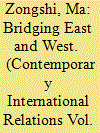

|
|
|
|
|
| Summary/Abstract |
Over the previous four decades a steadily growing thirst for news and information from East Asia, and China in particular, has been growing around the world. People want to understand China, a country that is rising rapidly but is greatly misunderstood despite the growing numbers of people learning the Chinese language and ideas that have been popularized such as Chimerica(China+America). Interest in China has been impeded by the Great Wall of indecipherable Chinese characters. No wonder so many people say that Chinese is “damn hard” to learn!
|
|
|
|
|
|
|
|
|
|
|
|
|
|
|
|
| 2 |
ID:
151217
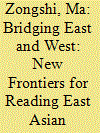

|
|
|
| 3 |
ID:
151198
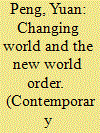

|
|
|
|
|
| Summary/Abstract |
Believe it or not, the world has changed not due to worldwide wars but in a reformative, progressive, inconspicuous way. Though there is no clear-cut division between quantitative change and the qualitative one, after the alternations of the Westphalian System, the Versailles-Washington System and the Yalta System, world order is being restructured for a fourth time, a historical moment unprecedented in the last 400 years. Dramatic, at times devastating, changes of order were once linked to globe-wide wars (hot or cold), but the current change in world order stems from regional conflicts such as those in Afghanistan, Iraq and elsewhere, nuclear crises in the DPRK and Iran, the Ukraine crisis, and friction over East China and South China seas. Rising new economies, sluggish Western economies with changing demographics, emerging non-state actors, and interlocking problems contest theWest’s leadership of the international system.
|
|
|
|
|
|
|
|
|
|
|
|
|
|
|
|
| 4 |
ID:
151214


|
|
|
|
|
| Summary/Abstract |
From June 2014, ISIS has waged war and controlled territory in areas of Syria and Iraq. ISIS is also expected to seek to control areas in China's periphery in South Asia, Southeast Asia and Central Asia. This poses a direct threat to China's own security and development as well as to public safety. This article analyzes how ISIS is expanding into these areas and evaluates the scope of its influence in South Asia, Southeast Asia and Central Asia. It also examines ISIS ideology, political objectives and strategy.
|
|
|
|
|
|
|
|
|
|
|
|
|
|
|
|
| 5 |
ID:
151215
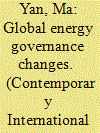

|
|
|
|
|
| Summary/Abstract |
The energy issue is a focal point in international relations not only at the level of nation-states but in transnational and interdisciplinary facets. The advance of globalization and scientific-technological development,the absolute need for reliable, continued energy supply for stability and the protection of humanity, make it imperative for all actors to coordinate and cooperate. Modern-day energy governance was given birth out of security concerns from major energy consumers. Today’s major energy importers such as China still need to guard energy supply security but,additionally, fluctuating prices also impact energy exporters.The non-marketization factor has accentuated the uncertainty of energy prices.The carrier of global energy governance currently is a multi-level, diverse and dispersed network.
|
|
|
|
|
|
|
|
|
|
|
|
|
|
|
|
| 6 |
ID:
151225
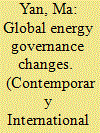

|
|
|
|
|
| Summary/Abstract |
The energy issue is a focal point in international relations not only at the level of nation-states but in transnational and interdisciplinary facets. The advance of globalization and scientific-technological development,the absolute need for reliable, continued energy supply for stability and the protection of humanity, make it imperative for all actors to coordinate and cooperate. Modern-day energy governance was given birth out of security concerns from major energy consumers. Today’s major energy importers such as China still need to guard energy supply security but,additionally, fluctuating prices also impact energy exporters.The non-marketization factor has accentuated the uncertainty of energy prices.The carrier of global energy governance currently is a multi-level, diverse and dispersed network.
|
|
|
|
|
|
|
|
|
|
|
|
|
|
|
|
| 7 |
ID:
151211


|
|
|
|
|
| Summary/Abstract |
Obama’s Middle East policy comes to its epilogue with the end of his 8-year White House tenancy. An aspirational speech in Cairo in 2009 and the shrinkage of US military in the Middle East in 2017 are the bookends to a shelf of events and decisions that are already being parsed and judged by historians and foreign relations experts. Bringing democracy to the Middle East is no longer a major US goal. When measured against the Pivot to Asia-Pacific and a potential pro-Russia foreign policy under Republican President Donald Trump, the Middle East is now seated as a second violin in American foreign policy.
|
|
|
|
|
|
|
|
|
|
|
|
|
|
|
|
| 8 |
ID:
151212


|
|
|
|
|
| Summary/Abstract |
Since the emergence of nuclear issues on the Korean Peninsula in the 1990s, the process of denuclearization has been unfolding, but has been unsatisfactory in promoting abandonment of nuclear weapons by the DPRK and reestablishing security in Northeast Asia. Gradually, the overall situation on the peninsula has worsened into an overall trend of deterioration. Especially since 2016, confrontation has further highlighted the complexity of the situation on the peninsula and the sharp increase of uncertainty. In order to solve the difficult problem and get rid of the security dilemma, the key time of “finding new answers to solve the old problems and finding good answers to new problems” has come, and the time has come for countries in the region to make concerted efforts to complement each other, brainstorm and explore ideas to ease the direction of development, thereby ensuring peace and stability and common prosperity in Northeast Asia.
|
|
|
|
|
|
|
|
|
|
|
|
|
|
|
|
| 9 |
ID:
151206


|
|
|
| 10 |
ID:
151209


|
|
|
|
|
| Summary/Abstract |
Pressure from the US and Europe in the form of diplomatic isolation, military confrontation and economic sanctions caused Russia to seek this new path of national development. Called "Pivot to East" by scholars within and outside Russia, the systemic procedure covers political, economic and military spheres. Russia has significantly lifted the status of the Asia-Pacific in its whole diplomatic layout. Selling its oil and natural gas resources and attracting Asian investment to Russia's Far East are part of the economic plan, and cooperative military production of higher-tech weaponry with Asian countries is part of the military's planned direction. This is a considerable change because, for some time, the Asia-Pacific region has had considerably less significance in Russian foreign affairs.Core documents such as Russia's "National Security Strategy" and "Tentative Ideas of Foreign Policy" usually listed Asia including China low on the list, always after the Commonwealth of Independent States (CIS), Europe and the US. As late as the end of 2015 the Asia-Pacific region was listed after CIS (though surpassing Europe and the US) in Russia's security strategy document.
|
|
|
|
|
|
|
|
|
|
|
|
|
|
|
|
|
|
|
|
|